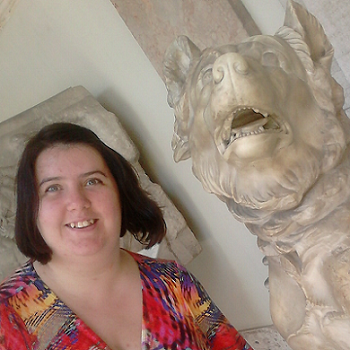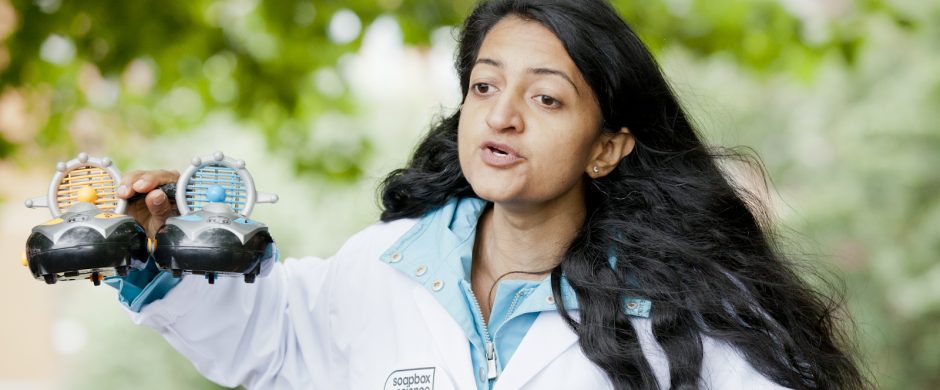 Irene O’Callaghan (@irenelovesdogs), University College Cork, is taking part in Soapbox Science Cork 2019 with the talk: “Counting bugs for cleaner rivers: how biodiversity and water quality connect”
Irene O’Callaghan (@irenelovesdogs), University College Cork, is taking part in Soapbox Science Cork 2019 with the talk: “Counting bugs for cleaner rivers: how biodiversity and water quality connect”
Soapbox Science: How did you get to your current position?
Irene O’Callaghan: My journey has not been the most straightforward! I had always loved the sciences, but for a little while found myself lost to them. After a brief stint obsessing over old manuscripts (although, I’m one of the few people who believes linguistics to be a science), I finally got my act together and set off in pursuit of my dreams. My first obstacle was deciding which of the natural sciences to specialize in, and after much deliberation I settled upon chemistry, because it allows you to do a lot of hands-on science, but also to learn about things which relate to other sciences. As I’ve never been one to fit in a box, I relished the opportunity to take electives in things like quantum mechanics and crystallography, which helped keep me interested in other fields. Throughout my undergrad, and beyond, I continued to dip into other fields, something that I have personally found to be very fulfilling.
At the end of my undergrad, I was very much focused on materials science, but I knew that this wasn’t really where my heart lay. I opted to instead continue my studies in analytical chemistry, which offers a useful skillset, valuable wherever you may end up. From my earliest years, the natural world had, more than anything else, held my interests captive. Going into the masters programme, I decided I’d had enough with turning my back on the things I was most passionate about, and instead I sought a middle ground. I found a research topic that could offer me a pathway into environmental science, while making the most of what I had learnt as a chemist, and I am now pursuing this work as a PhD candidate.
SS: What, or who, inspired you to follow a career in science?
IOC: First and foremost, at a very young age I came to understand the connection between science and the things that I was already passionate about – animals, the natural world, the stars… This helped me relate to science.
Secondly, as I grew up, I took part in a wide range of STEM outreach programmes. This not only gave me something to do, it held my interest and assured me that science was accessible and something I could realistically strive for.
More recently, faced with the difficult decision of abandoning a career path I’d come to love (historical linguistics) for a path I’d always loved (science), it was my support system that finally gave me the courage to venture into the unknown – and it was most certainly worth it!
SS: What is the most fascinating aspect of your research?
IOC: The thing that fascinates me most about my research is the unknown. I love that research has made me shed any sense of a comfort zone. The fact that I can begin experimental work, not knowing what the end result is going to look like, makes it feel more like exploration than work! Every morning I look forward to finding out what the day has to hold, and chasing after new frontiers.
SS: What attracted you to Soapbox Science in the first place?
IOC: I see great value in any activity that makes science accessibly to the public. I attended enough events over the years to know that it really can make a difference to someone. Soapbox Science, in particular, offers the opportunity to communicate what scientists do, as opposed to simply shouting about how great science is (although, it is!) Many people appreciate being shown that science is understandable, without feeling like it’s being overly simplified.
SS: Sum up in one word your expectations for the event?
IOC: Frondescence.
SS: If you could change one thing about the scientific culture right now, what would it be?
IOC: The main cultural malaise I’ve come across is a lack of interest in interdisciplinary work. I firmly believe that the biggest scientific questions can be answered only when researchers from different fields unite and look at the gaps between the disciplines. There has been an increase in the number of “interdisciplinary” research projects, but having people involved from different disciplines doesn’t achieve much if they are not willing to speak a common language and pool their strengths and knowledge. I reckon you could call it a breakdown in communication, or, as a horse person, expertise blinkers! Good science happens every day, but great science can only happen when diverse minds come together.
